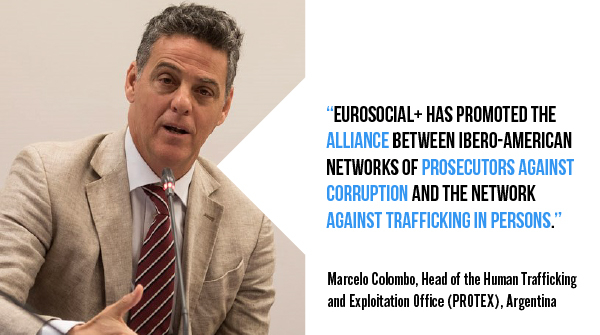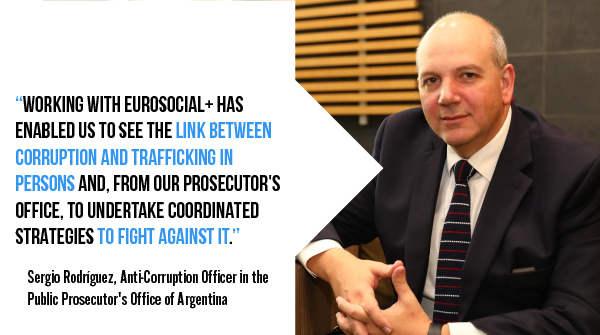Latin American countries are progressively incorporating a gender perspective into anti-corruption strategies. They are also developing specific tools to protect women and girls from gender-related violence. The European Union cooperation programme EUROsociAL+ is supporting this action through its initiative "Women and corruption".
Corruption is multifaceted and impacts differently on women and girls in Latin America. According to the Global Barometer of Corruption in Latin America and the Caribbean in 2019, one in five women or girls experienced sexual extortion – known as ‘sextortion’ – that is, situations in which sexual favours are required to access public services (1).

Such practices are not always seen as forms of corruption. Worse still, they are sometimes socially accepted and normalised. Most of the time, they remain unpunished. There is a deep lack of trust in the authorities from the victims, and a lack of awareness of this issue from public officials. Consequently, this form of corruption often goes unnoticed and is therefore extremely difficult to address.
The objective of “Women and Corruption”, a project of the Democratic Governance area of the EU cooperation programme with Latin America EUROsociAL+, is to understand the impact of corruption on women and girls, and to promote strategies to combat this.
At national level, dialogues were initiated in Argentina, Peru, Chile and Guatemala. These have helped to place the issue on the international agenda and to create links between stakeholders.
WOMEN AND CORRUPTION: BEST PRACTICES
The project's lead expert Ana Linda Solano, and the team leader Borja Díaz, highlight the best practices from the EUROsociAL+ project:
- In-depth assessments & data gathering. The project has collected empirical evidence and identified typologies of corruption linked to trafficking and 'sextortion', to contribute to public policy building and enforcement. It has also helped to raise awareness of the need to collect more relevant data and information for this purpose.
- Peer learning. The Anti-Corruption Network and the AIAMP Trafficking in Persons Network have analysed common problems and developed joint solutions at regional and national level.
- Multi-stakeholder dialogues. In addition to working with AIAMP, EUROsociAL+ collaborates with civil society organisations and networks such as the OAS, TI, UN Women and UNODC , and organises discussions in the framework of the C-20 and regional CEDAW consultations in relation to human trafficking.
- Knowledge management and awareness. The creation of a group in Capacity4dev on “Women and Corruption” has made it possible to make the work carried out within the framework of the project, visible and central. This includes articles, radio programmes and EUROsociAL TV, thus giving a voice to operators in the justice system, to civil society and to victims.
- Results-based approach. Results include raising awareness; the improvement of inter-institutional coordination mechanisms; the inclusion of the issue in strategic or anti-corruption national plan; and the provision of a risk assessment tool to identify corrupt practices to break the human trafficking control chain.
Spaces for awareness, dialogue and the exchange of experiences

A key starting point of the project was to create spaces for dialogue and the exchange of experiences. EUROsociAL+ invited public institution networks, civil society, and international organisations working on corruption and gender equality policies. The objective was to share information and raise awareness of the scope and the nature of the issue of ‘sextortion’ in the region.
Fighting corruption and human trafficking
Corruption is one of the main facilitators of human trafficking. A transnational and interagency approach has been developed by EUROsociAL+ to promote collaboration between different prosecutors and investigative agencies, such as the alliance between the Ibero-American Network of Prosecutors against Corruption, and the Network of Human Trafficking and Smuggling of Migrants of AIAMP. As a result, prosecutors in Latin American countries are raising awareness. They are also developing specific strategies in Argentina, Chile, Paraguay, among others.

From regional to national scale: the case of Argentina
In Argentina, with the support of EUROsociAL+, the Public Prosecutor's Office – composed of specialists in human trafficking and anti-corruption - has developed a tool which creates typologies and detects risks of corruption in cases of human trafficking for sexual exploitation.
Progress in the fight against sextortion
Educational campaigns and awareness-raising activities help to shed light on sextortion and to criminalise it. The Ibero-American Network of Prosecutors against Corruption is working to ensure that the fight against sexual corruption becomes public policy.
At national level, some countries are also beginning to take steps in that direction. In Peru, the High-Level Anti-Corruption Commission is addressing the criminalisation of sexual extortion in its first anti-corruption plan with a gender perspective. The debate is also opening up in Chile. In Guatemala, the Public Prosecutor's Office created a Corruption and Gender Round Table to tackle this specific type of crime.
|
ABOUT WOMEN AND CORRUPTION “Women and Corruption” is an initiative of the EU Cooperation Programme with Latin American countries for Social Cohesion and EUROsociAL+. It was implemented in 2018 under its Democratic Governance Area, coordinated by the International and Ibero-American Foundation for Public Administration and Policies (FIIAPP). It aims to promote the fight against the impact of corruption on women and girls from Latin America; those who more frequently suffer from corrupt practices specifically due to their gender and vulnerability. Two priority areas of action were identified: First, the fight against corruption which facilitates human trafficking. Second, 'sextortion', that is the request for sexual favours from women as a bargaining chip to access public services. Two common examples of 'sextortion' are: judicial officials or police officers who demand sexual favours from women in exchange for helping them or their relatives in procedures carried out in offices under their charge, and university professors who ask their students for sexual exchanges in return for a pass grade. The forms of corruption associated with human trafficking show cases of police, judges, prosecutors or immigration officials paid in money or sexual favours by criminal networks to look the other way or even actively collaborate. In addition, there are prison guards who allow girls and women to be brought in and sexually exploited by the leaders of a criminal organisation. The effects of all of this must be identified, made visible, measured, prevented and combated. To do this, EUROsociAL+ promotes gender mainstreaming in public policies and the inclusion of specific action in national plans through the exchange of experiences. Likewise, it promotes inter-institutional cooperation and coordination, as well as tools that reinforce the work of justice workers, with a special emphasis on prosecutors. Finally, the “Women and Corruption” initiative promotes the work of public institutions with civil society, to raise awareness. It aims to encouraging women to speak out, and to prioritising the protection of whistle-blowers. These steps are intended to address three of the Sustainable Development Goals (SDGs): SDG 16, on achieving peace, justice and strong institutions; SDG 5, on gender equality and female empowerment; and SDG 17, an alliance to achieve such objectives. Challenges and next steps |
Click on the play button below to watch our video about the work of EUROsociAL+ to fight 'sextortion' in Latin America.
(1) According to the United Nations Office on Drugs and Crime (UNODC) corruption also plays an important role in facilitating and fostering trafficking in persons, a crime that mostly affects women and girls
This article was written by EUROsociAL+ Women and Corruption Project’s Team Leader, Borja Díaz Rivillas, and Principal Expert, Ana Linda Solano, with the support of the Capacity4dev editorial team.
Credit: Videos © Capacity4dev | Photo ©Borja Diaz Rivillas






Log in with your EU Login account to post or comment on the platform.